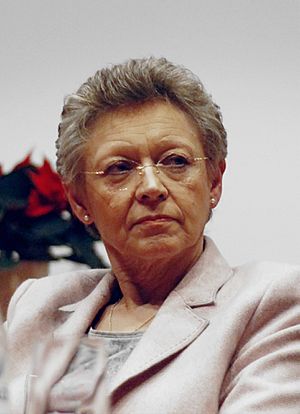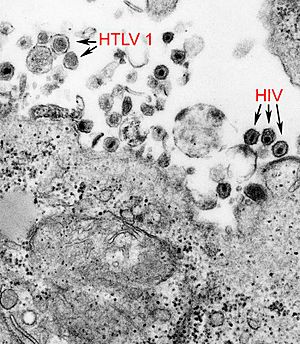Françoise Barré-Sinoussi facts for kids
Quick facts for kids
Françoise Barré-Sinoussi
|
|
|---|---|

Barré-Sinoussi in 2008
|
|
| Born | 30 July 1947 Paris, France
|
| Alma mater | University of Paris |
| Known for | Co-discoverer of HIV |
| Awards | 2008 Nobel Prize in Physiology or Medicine |
| Scientific career | |
| Fields | Virology |
| Institutions | Pasteur Institute |
Françoise Barré-Sinoussi (born 30 July 1947) is a French virologist. A virologist is a scientist who studies viruses. She is a professor at the Pasteur Institute in Paris. Barré-Sinoussi did important work in finding the human immunodeficiency virus (HIV). HIV is the virus that causes AIDS. In 2008, she won the Nobel Prize in Physiology or Medicine. She shared the award with her former teacher, Luc Montagnier. They won for discovering HIV. She stopped her active research in 2015 and fully retired by 2017.
Contents
Early Life and Science Interest
Françoise Barré-Sinoussi was interested in science from a very young age. When she was a child, she spent hours studying insects and animals. She compared how they behaved and tried to understand them.
She soon realized she was very good at science subjects. She told her parents she wanted to go to university to study science. She also wanted to become a researcher. Barré-Sinoussi thought studying medicine was more expensive and took longer. So, she chose science.
After two years at university, she looked for part-time lab work. She wanted to make sure science was the right career for her. After almost a year of searching, she was accepted by the Pasteur Institute. Her part-time work there quickly became full-time.
She only went to university for exams. She relied on her friends' notes because she was not in class often. But she actually scored higher on her exams than before. This was because she finally had a strong reason to study. She knew a career in science was what she wanted.
Discovering HIV
Barré-Sinoussi joined the Pasteur Institute in Paris in the early 1970s. She earned her PhD degree in 1974. After that, she worked at the National Institutes of Health in the U.S. Then she returned to the Pasteur Institute. She worked in Luc Montagnier's team.
In the early 1980s, a new disease called AIDS appeared. Scientists did not yet know what caused it. Barré-Sinoussi worked with Luc Montagnier, Jean-Claude Chermann, and others. They found a retrovirus from a patient's swollen lymph node. This virus was later named HIV-1. It was the cause of AIDS.
This discovery was very important. It helped scientists create tests to find the virus. These tests helped control the spread of HIV. They also helped guide how to treat people with AIDS. This scientific progress saved many lives.
How the Discovery Happened
When Françoise Barré-Sinoussi started studying retroviruses, many scientists were looking at how they caused cancer. She decided to study the link between retroviruses and leukemia in mice.
Later, when the new disease (AIDS) appeared, doctors asked if a retrovirus caused it. Barré-Sinoussi and her colleagues, including Luc Montagnier, thought it might be. But they knew it was not HTLV, the only known retrovirus at the time.
In the early 1980s, Barré-Sinoussi knew how to find "reverse transcriptase" activity. If this activity is present, it means the virus is a retrovirus. In December 1982, they started serious research. Doctors noticed the disease attacked immune cells, especially CD4 cells.
It was hard to find the virus in patients with advanced AIDS. So, Barré-Sinoussi and her team used a lymph node biopsy from a patient. This patient had swollen lymph nodes, a common early symptom. After two weeks, they found reverse transcriptase activity. It increased for a short time, then dropped as the cells died.
To save the culture, they added new cells from a blood donor. This worked! The virus spread to the new cells, and reverse transcriptase activity was high again. They named the virus LAV (Lymphadenopathy Associated Virus). Later, it was renamed HIV.
By 1983, it was clear that HIV affected many different people. It was not just limited to certain groups. This showed that AIDS was a widespread health crisis. Barré-Sinoussi continued her HIV research until her retirement.
Leadership and Global Work
Françoise Barré-Sinoussi stayed at the Pasteur Institute. In 1992, she became the head of the Biology of Retroviruses Unit. This unit was renamed the Regulation of Retroviral Infections Unit in 2005. Her team now works on finding a vaccine for HIV. They also study how to protect against AIDS for new treatments.
Barré-Sinoussi has also worked with countries that have fewer resources. These include Vietnam and the Central African Republic. Her experiences with the World Health Organization opened her eyes. They made her want to keep working with scientists in Africa and Asia. This teamwork has led to many exchanges and workshops. Young scientists from these countries can learn from researchers in Paris.
In 2006, Françoise Barré-Sinoussi was elected to the International AIDS Society (IAS) Governing Council. She was the president of the IAS from 2012 to 2016. She also helped plan the 9th IAS Conference on HIV Science in 2017. She is currently a co-chair of the IAS. She works towards finding a cure for HIV.
Professor Barré-Sinoussi believes scientists have made good progress. This is because of new treatments for HIV. These treatments are now available to many people living with AIDS. But finding a cure will take time. It also needs continued investment in research. She says finding a cure for HIV is a very important goal. It is a top priority for future HIV research. Even though this research is still new, big steps are being made toward a cure.
Awards and Recognition
Barré-Sinoussi shared the 2008 Nobel Prize in Physiology or Medicine. She won it with Luc Montagnier for discovering HIV. She also shared it with Harald zur Hausen, who found the viral cause of cervical cancer.
Besides the Nobel Prize, Barré-Sinoussi has received many other awards:
- The Sovac Prize
- The Körber European Science Prize
- The Prize of the French Academy of Sciences
- The King Faisal International Prize
- The International AIDS Society Prize
- She was named an Officer of the Legion of Honour in 2006. She was promoted to Commander in 2009 and Grand Officer in 2013.
- She received honorary Doctor of Science degrees from Tulane University in 2009. She also received an honorary Doctor of Medicine from the University of New South Wales in 2014.
- In 2014, she received an honorary doctorate from the École Polytechnique Fédérale de Lausanne.
See also
 In Spanish: Françoise Barré-Sinoussi para niños
In Spanish: Françoise Barré-Sinoussi para niños
- History of RNA biology
- List of female Nobel laureates
- List of RNA biologists
- Timeline of women in science
 | Dorothy Vaughan |
 | Charles Henry Turner |
 | Hildrus Poindexter |
 | Henry Cecil McBay |


